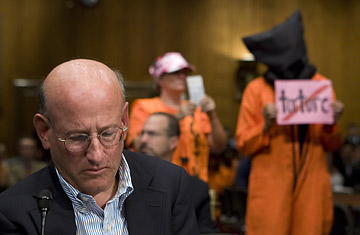
Richard Shiffrin, former deputy general counsel for intelligence at the Defense Department, prepares to testify during a hearing on the origins of aggressive interrogation techniques and treatment of detainees in U.S. Custody on Capitol Hill, Washington, June 17, 2008.
Despite years of investigation into alleged abuse and death of prisoners in U.S. custody since 9/11, the only Americans held accountable have been the low-ranking "bad apples" convicted for the worst atrocities at Iraq's Abu Ghraib prison. No official blame has been assigned to higher-ups for abuses at Guantanamo or in Afghanistan, much less for crimes allegedly committed by U.S. personnel in various secret CIA prisons around the world. The Senate Armed Services Committee sought to correct that on Tuesday by holding the nation's first public hearing into who at the top should be held accountable for the abuse of detainees held by the U.S.
Using new documentary evidence, the Senate committee offered a number of key findings:
In the words of committee chairman, Sen. Carl Levin of Michigan, evidence at the hearing showed "how techniques, which are used teach American soldiers to resist abusive interrogations by enemies that refuse to follow the Geneva Conventions, were turned on their head and sanctioned by Department of Defense officials for use" on prisoners held by the U.S.
One memo giving an account of a meeting of senior officials overseeing interrogations at Guantanamo documents a lively discussion over interrogation methods. At one point in the meeting, an officer says "We can't do sleep deprivation." Lt. Col. Diane Beaver, then the top legal advisor at Guantanamo, replies, "Yes, we can — with approval." Another officer notes, "We have had many reports from [Afghanistan] about sleep deprivation being used." Beaver answers: "True, but officially it is not happening. It is not being reported officially. The ICRC [International Committee of the Red Cross] is a serious concern. They will be in and out, scrutinizing our operations, unless they are displeased and decide to protest and leave. This would draw a lot of negative attention."
Later in the same memo, a senior CIA lawyer warns, "If someone dies while aggressive techniques are being used, regardless of cause of death, the backlash of attention would be severely detrimental." To that an officer replies, "Videotapes are subject to too much scrutiny in court," prompting the CIA lawyer to add, "The videotaping of even totally legal techniques will look 'ugly.'"
At another point Lt. Col. Beaver — who has retired from the military and now serves the Pentagon in a civilian capacity — asks, "Does SERE employ the 'wet towel' technique [a reference to waterboarding]?" The CIA lawyer answers: "If a well-trained individual is used to perform this technique it can feel like you're drowning. The lymphatic system will react as if you're suffocating, but your body will not cease to function."
A variety of witnesses called before the committee tried to explain how the abusive interrogation system evolved, while minimizing their own responsibility. Richard Shiffren, a former deputy general counsel at the Pentagon dealing with intelligence, explained that the U.S. military lacked expertise in interrogation after 9/11, but was desperate to extract intelligence from prisoners captured on the battlefields of Afghanistan. Instead of consulting the FBI — an agency with long experience in conducting effective interrogations using lawful methods — the Pentagon opted to use the enemy tactics taught in the SERE program. Many of those have since been found to be illegal.
Witness Alberto Mora, the Navy's former top lawyer, called the abusive interrogation program a "mistake of massive proportions." He had been one of very few senior Pentagon officials to protest at the time, and his objections led to the cancellation of some of the program's worst aspects. But both Beaver and Rear Admiral Jane G. Dalton, the former top legal advisor to the chairman of the Joint Chiefs of Staff, gave answers that were repeatedly challenged by Senators. When both asserted that the use of dogs and stripping prisoners naked had never been authorized at Guantanamo, their attention was drawn to just such an apparent authorization being cited in documents that both conceded they had read.
The final witness of the day was former Pentagon general counsel William Haynes. He admitted that he had never read the strongly worded objections to the harsh techniques filed by lawyers from all four branches of the military. Instead, Haynes said he approved many of those harsh methods based on a memo written by Beaver — a memo described by a number of experts as riddled with errors and flawed legal reasoning.
